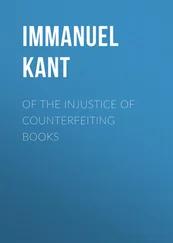Human reason is by nature architectonic. That is to say, it regards all cognitions as parts of a possible system, and hence accepts only such principles as at least do not incapacitate a cognition to which we may have attained from being placed along with others in a general system. But the propositions of the antithesis are of a character which renders the completion of an edifice of cognitions impossible. According to these, beyond one state or epoch of the world there is always to be found one more ancient; in every part always other parts themselves divisible; preceding every event another, the origin of which must itself be sought still higher; and everything in existence is conditioned, and still not dependent on an unconditioned and primal existence. As, therefore, the antithesis will not concede the existence of a first beginning which might be available as a foundation, a complete edifice of cognition, in the presence of such hypothesis, is utterly impossible. Thus the architectonic interest of reason, which requires a unity — not empirical, but a priori and rational — forms a natural recommendation for the assertions of the thesis in our antinomy.
But if any one could free himself entirely from all considerations of interest, and weigh without partiality the assertions of reason, attending only to their content, irrespective of the consequences which follow from them; such a person, on the supposition that he knew no other way out of the confusion than to settle the truth of one or other of the conflicting doctrines, would live in a state of continual hesitation. Today, he would feel convinced that the human will is free; tomorrow, considering the indissoluble chain of nature, he would look on freedom as a mere illusion and declare nature to be all-in-all. But, if he were called to action, the play of the merely speculative reason would disappear like the shapes of a dream, and practical interest would dictate his choice of principles. But, as it well befits a reflective and inquiring being to devote certain periods of time to the examination of its own reason — to divest itself of all partiality, and frankly to communicate its observations for the judgement and opinion of others; so no one can be blamed for, much less prevented from, placing both parties on their trial, with permission to end themselves, free from intimidation, before intimidation, before a sworn jury of equal condition with themselves — the condition of weak and fallible men.
57 It is, however, still a matter of doubt whether Epicurus ever propounded these principles as directions for the objective employment of the understanding. If, indeed, they were nothing more than maxims for the speculative exercise of reason, he gives evidence therein a more genuine philosophic spirit than any of the philosophers of antiquity. That, in the explanation of phenomena, we must proceed as if the field of inquiry had neither limits in space nor commencement in time; that we must be satisfied with the teaching of experience in reference to the material of which the world is posed; that we must not look for any other mode of the origination of events than that which is determined by the unalterable laws of nature; and finally, that we not employ the hypothesis of a cause distinct from the world to account for a phenomenon or for the world itself — are principles for the extension of speculative philosophy, and the discovery of the true sources of the principles of morals, which, however little conformed to in the present day, are undoubtedly correct. At the same time, any one desirous of ignoring, in mere speculation, these dogmatical propositions, need not for that reason be accused of denying them.
Section IV. Of the necessity imposed upon Pure Reason of presenting a Solution of its Transcendental Problems.
Table of Contents
To avow an ability to solve all problems and to answer all questions would be a profession certain to convict any philosopher of extravagant boasting and self-conceit, and at once to destroy the confidence that might otherwise have been reposed in him. There are, however, sciences so constituted that every question arising within their sphere must necessarily be capable of receiving an answer from the knowledge already possessed, for the answer must be received from the same sources whence the question arose. In such sciences it is not allowable to excuse ourselves on the plea of necessary and unavoidable ignorance; a solution is absolutely requisite. The rule of right and wrong must help us to the knowledge of what is right or wrong in all possible cases; otherwise, the idea of obligation or duty would be utterly null, for we cannot have any obligation to that which we cannot know. On the other hand, in our investigations of the phenomena of nature, much must remain uncertain, and many questions continue insoluble; because what we know of nature is far from being sufficient to explain all the phenomena that are presented to our observation. Now the question is: “Whether there is in transcendental philosophy any question, relating to an object presented to pure reason, which is unanswerable by this reason; and whether we must regard the subject of the question as quite uncertain, so far as our knowledge extends, and must give it a place among those subjects, of which we have just so much conception as is sufficient to enable us to raise a question — faculty or materials failing us, however, when we attempt an answer.
Now I maintain that, among all speculative cognition, the peculiarity of transcendental philosophy is that there is no question, relating to an object presented to pure reason, which is insoluble by this reason; and that the profession of unavoidable ignorance — the problem being alleged to be beyond the reach of our faculties — cannot free us from the obligation to present a complete and satisfactory answer. For the very conception which enables us to raise the question must give us the power of answering it; inasmuch as the object, as in the case of right and wrong, is not to be discovered out of the conception.
But, in transcendental philosophy, it is only the cosmological questions to which we can demand a satisfactory answer in relation to the constitution of their object; and the philosopher is not permitted to avail himself of the pretext of necessary ignorance and impenetrable obscurity. These questions relate solely to the cosmological ideas. For the object must be given in experience, and the question relates to the adequateness of the object to an idea. If the object is transcendental and therefore itself unknown; if the question, for example, is whether the object — the something, the phenomenon of which (internal — in ourselves) is thought — that is to say, the soul, is in itself a simple being; or whether there is a cause of all things, which is absolutely necessary — in such cases we are seeking for our idea an object, of which we may confess that it is unknown to us, though we must not on that account assert that it is impossible. 58 The cosmological ideas alone posses the peculiarity that we can presuppose the object of them and the empirical synthesis requisite for the conception of that object to be given; and the question, which arises from these ideas, relates merely to the progress of this synthesis, in so far as it must contain absolute totality — which, however, is not empirical, as it cannot be given in any experience. Now, as the question here is solely in regard to a thing as the object of a possible experience and not as a thing in itself, the answer to the transcendental cosmological question need not be sought out of the idea, for the question does not regard an object in itself. The question in relation to a possible experience is not, “What can be given in an experience in concreto” but “what is contained in the idea, to which the empirical synthesis must approximate.” The question must therefore be capable of solution from the idea alone. For the idea is a creation of reason itself, which therefore cannot disclaim the obligation to answer or refer us to the unknown object.
Читать дальше












